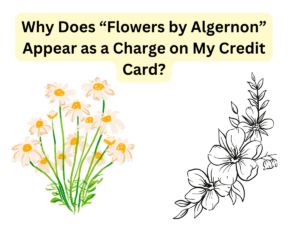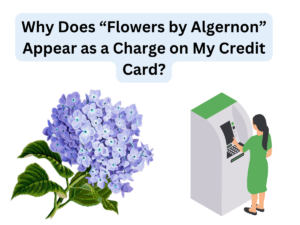It’s not unusual to look at your credit card account in the current digital era and discover a transaction that you don’t instantly recognize. “Flowers by Algernon” is one such accusation that has left many people perplexed. You’re not the only one who has seen this on your statement lately. This post will discuss the potential causes of this enigmatic charge, what “Flowers by Algernon” could mean, and what you can do to allay any worries you may have.


Understanding the Charge: What is “Flowers by Algernon”?
It’s critical to comprehend what “Flowers by Algernon” could mean before delving into the charges. The name itself is fascinating and appears to be a word play, maybe alluding to Daniel Keyes’s famous science fiction short novel Flowers for Algernon. The narrative, which was eventually made into a book and a movie, centers on Charlie Gordon, a guy who has his IQ raised through an experimental process. The narrative explores issues of humanity, intellect, and the moral ramifications of technological progress in a moving and thought-provoking way. It’s possible that “Flowers by Algernon” is the name of a company, service, or product that has chosen to use the name as a branding tactic because of the literary allusion. However, it’s hard to determine exactly what the accusation relates to without more context. We’ll look at some of the most typical explanations for why this charge might show up on your credit card account below.
Possible Reasons for the Charge
Subscription Services or Memberships Subscription services are among the most frequent causes of credit card transactions that go unnoticed. It’s simple to overlook the free trials or automatic renewals that many businesses provide for their services until you notice the charge on your account. A subscription-based service like a book club, flower delivery service, or even a digital content platform can be called “Flowers by Algernon.” The transaction can be associated with a free trial or subscription service that you recently signed up for. Some businesses give their billing descriptors unusual or imaginative titles, which might make it challenging to recognize the charge at first look. Online Purchases Another option is that you bought anything from an internet marketplace or company called “Flowers by Algernon.” The billing descriptors used by e-commerce platforms frequently have unique names, so they might not instantly correspond to the name of the store or item you purchased. The charge could have originated from a recent online transaction you made, particularly from a smaller or independent merchant. Digital Content or Apps The price can be connected to in-app purchases, software downloads, or digital content purchases (such eBooks, music, or movies). It may occasionally be perplexing when app developers or digital content suppliers employ innovative titles for their billing descriptions. For instance, the transaction may be listed under the name “Flowers by Algernon” if you bought an eBook or CD about the author. Charitable Donations Another possibility is that “Flowers by Algernon” is the name of a fundraising initiative or nonprofit. The charge may show up under this name if you recently donated to a cause. Some nonprofits give their campaigns imaginative or themed titles, particularly if they are associated with a particular occasion or project. Fraud or Unauthorized Charges Even if the aforementioned explanations are largely harmless, it’s crucial to take fraud or unauthorized charges into account. Regrettably, credit card theft is widespread, and con artists frequently conceal their activities by using cryptic or deceptive identities. Your card may have been hacked if you are unable to identify the charge and link it to any previous purchases or subscriptions.Steps to Take if You Don’t Recognize the Charge
If you’re unsure about the charge and want to get to the bottom of it, here are some steps you can take: Review Your Recent Transactions To begin, look over your most recent transactions to determine whether you recognize the charge. Consider any recent donations, internet purchases, or subscriptions you may have made. Check to see if any of the free trials you frequently sign up for have turned into paying memberships. Check Your Email for Receipts Following a purchase or subscription, a lot of businesses send email confirmations or receipts. To discover a receipt or confirmation, search your email inbox using terms like “Flowers by Algernon,” “Algernon,” or “Flowers.” Contact Your Bank or Credit Card Company For help identifying the charge, get in touch with your bank or credit card company. They are able to give further facts about the transaction, including the date, amount, and merchant information. If the charge is shown to be false, they might be able to reverse it in certain situations. Dispute the Charge if Necessary You can dispute the transaction with your credit card company if you think it was fraudulent or unauthorized. You can contest illegal charges using the dispute resolution procedure offered by the majority of credit card providers. Make sure you back up your claim with any pertinent data or supporting proof. Monitor Your Account for Future Charges Once the problem has been fixed, keep an eye out for any further costs that aren’t shown on your credit card statements. To keep up with account activities, think about establishing transaction alerts or notifications.
Why is There a Charge for “Flowers by Algernon” When I Don’t Recognize the Transaction on My Credit Card?
If you see a charge for “Flowers by Algernon” on your credit card and don’t remember it, it’s essential to review your purchase history. Sometimes, floral shops might apply unexpected fees. For clarity, consider seeking resources like “understanding laurel tree charges explained” to understand specific billing practices.
